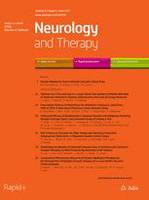
Archives of Epilepsy
Scope & Guideline
Exploring the frontiers of neuroscience and clinical practice.
Introduction
Aims and Scopes
- Clinical Research on Epilepsy Management:
The journal emphasizes clinical studies that investigate various aspects of epilepsy management, including medication adherence, treatment outcomes, and the impact of epilepsy on quality of life. - Neurobiological and Genetic Studies:
Research exploring the neurobiological mechanisms and genetic factors contributing to epilepsy is a core focus, including studies on specific gene variants and their associated phenotypes. - Epidemiological and Public Health Aspects:
The journal addresses the epidemiology of epilepsy, examining trends, risk factors, and public health implications, particularly in the context of global health crises such as the COVID-19 pandemic. - Innovative Therapeutic Approaches:
Archives of Epilepsy publishes research on novel therapeutic strategies, including pharmacological trials, surgical interventions, and alternative treatments such as the ketogenic diet. - Neuropsychological and Cognitive Impact:
The impact of epilepsy and its treatments on cognitive functions and neuropsychological outcomes is a significant area of interest, with studies assessing the cognitive effects of antiepileptic drugs.
Trending and Emerging
- Impact of COVID-19 on Epilepsy:
Research examining the effects of the COVID-19 pandemic on epilepsy patients, including changes in treatment patterns and seizure frequency, has emerged as a significant theme, highlighting the need for adaptive management during crises. - Health Equity and Access to Care:
Studies addressing health equity in epilepsy care, including disparities in treatment access and outcomes for different demographics, have gained traction, reflecting a broader societal focus on equity in healthcare. - Neuropsychological Assessments and Quality of Life:
There is an increasing emphasis on understanding the neuropsychological aspects of epilepsy and their impact on patients' quality of life, leading to studies that explore cognitive functions and psychosocial dimensions. - Innovative Diagnostic and Monitoring Techniques:
Emerging themes include the use of advanced diagnostic techniques and monitoring technologies, such as video-EEG and digital neuropsychological assessments, which enhance the understanding and management of epilepsy. - Genetic and Precision Medicine Approaches:
The exploration of genetic factors and precision medicine in epilepsy treatment is on the rise, with research focusing on how individual genetic profiles can inform tailored treatment strategies.
Declining or Waning
- Traditional Pharmacological Studies:
There has been a noticeable decrease in studies that solely focus on traditional pharmacological treatments without exploring their broader implications or novel combinations with other therapies. - Basic Science Studies Without Clinical Relevance:
Research that emphasizes basic science without direct clinical application or relevance to patient care has become less common, as there is a stronger push towards translational research that connects laboratory findings to clinical practice. - Single-Center Observational Studies:
The trend towards multi-center and larger-scale observational studies has led to a decline in single-center studies, which may not provide sufficient generalizability or impact in the field.
Similar Journals

ACTA NEUROLOGICA BELGICA
Exploring the Depths of Neurological Research.ACTA NEUROLOGICA BELGICA is a leading academic journal published by Springer Heidelberg, dedicated to advancing the field of neurology and medicine. With an ISSN of 0300-9009 and E-ISSN 2240-2993, this journal has been a vital resource since its inception, contributing significantly to neurological research and clinical practice. It holds a respectable impact factor with categories spanning from Q2 in Medicine (miscellaneous) to Q3 in Neurology (clinical) as of 2023, indicating its prominence in the scientific community. The journal's extensive coverage since 1959 enhances its historical relevance, while its ongoing publication until 2024 ensures the latest developments are readily accessible. Researchers and practitioners can benefit from its rigorous peer-reviewed articles, which are crucial for staying current in this rapidly evolving discipline. As a scholarly platform, ACTA NEUROLOGICA BELGICA plays a pivotal role in disseminating knowledge and fostering innovation in neurology, making it a must-read for professionals, students, and anyone involved in the field.

Epilepsi
Bridging knowledge and practice in epilepsy care.Epilepsi is an esteemed academic journal dedicated to advancing the field of epilepsy research and treatment, published by KARE PUBL. With its open access model established since 2017, the journal ensures that vital research findings are easily accessible to a global audience, thereby fostering collaboration and knowledge sharing among researchers, healthcare professionals, and students. The journal focuses on a comprehensive range of topics within neurology, including clinical studies, therapeutic advancements, and innovative approaches to epilepsy management. Located in Istanbul, Turkey, Epilepsi aims to bridge the gap between research and practice, enhancing understanding and patient care for individuals affected by epilepsy. Its commitment to high-quality, peer-reviewed content makes it a significant resource for anyone involved in epilepsy research or clinical practice.

Neurology and Therapy
Advancing Neurological Health Through Open Access ResearchNeurology and Therapy, published by SPRINGER LONDON LTD, stands as a pivotal platform for researchers and practitioners in the field of neurology and its therapeutic applications. This Open Access journal, active since 2012, facilitates the dissemination of innovative studies and cutting-edge findings aimed at improving neurological health. With an impressive ranking in the 2023 Scopus Rankings, where it holds a Q2 category in Neurology and a Q1 category in Clinical Neurology, it underscores its prominence in advancing neurological research. The journal's intriguing scope encompasses a wide-ranging exploration of neurological disorders, treatment methodologies, and healthcare strategies, making it a valuable resource for those vested in enhancing patient outcomes. With an appealing average impact factor, readers are encouraged to dive into the latest advancements and engage with the scholarly discussions that are shaping the future of neurology.

EPILEPTIC DISORDERS
Unraveling the Complexities of EpilepsyEpileptic Disorders is a leading journal dedicated to the field of epilepsy research and its clinical implications, published by Wiley. With its ISSN 1294-9361 and E-ISSN 1950-6945, the journal has established a significant presence in the medical and neurological communities, reflecting its commitment to advancing knowledge in the study of epilepsy and related disorders. Covering a broad spectrum of topics, Epileptic Disorders aims to provide a platform for researchers and clinicians to share cutting-edge research findings, clinical insights, and innovative treatments, maintaining a robust presence in Q2 quartiles across multiple categories including Medicine (miscellaneous) and Neurology. The journal, which has been in continuous publication since 1999, also ranks within the 51st and 47th percentiles in the Scopus rankings for Medicine and Neuroscience, respectively, underscoring its relevance and impact in the field. Although not an open-access publication, Epileptic Disorders remains a crucial resource for those seeking to deepen their understanding of epilepsy and improve patient care through research.

Archives of Neuroscience
Bridging research and clinical practice for a healthier brain.Archives of Neuroscience is a multidisciplinary journal dedicated to advancing the field of neuroscience through the publication of original research articles, review papers, and case studies. Published by BRIEFLAND, this journal aims to bridge the gap between neuroscience research and clinical applications, fostering a deeper understanding of brain function, neurological disorders, and potential therapeutic approaches. With an ISSN of 2322-3944 and an E-ISSN of 2322-5769, Archives of Neuroscience serves as an essential platform for researchers, professionals, and students alike, encouraging open access to knowledge and insights that drive innovation in the field. Although coverage was discontinued in Scopus from 2016 to 2017, the journal continues to uphold rigorous standards of academic excellence, making it a valuable resource for the neuroscience community seeking to explore and disseminate new findings. The journal is committed to providing timely access to research tools and findings that are crucial for informed decision-making in both academic and clinical settings.

Clinical Epileptology
Advancing epilepsy research for better patient outcomes.Clinical Epileptology, published by Springer Heidelberg, is an emerging open-access journal that aims to advance the understanding of epilepsy through rigorous research and clinical studies. With an ISSN of 2948-104X and E-ISSN of 2948-1058, this journal serves as a vital platform for researchers, clinicians, and students within the fields of Neurology, Pediatrics, and Perinatology. Although still in its formative years, spanning from 2023 to 2024, the journal aspires to fill the knowledge gaps in epilepsy research, thereby improving patient outcomes. Despite its initial Scopus rankings placing it within the 12th and 19th percentiles in respective categories, Clinical Epileptology is poised to make a significant impact by fostering interdisciplinary collaboration and disseminating high-quality findings. With options for open access, this journal ensures that groundbreaking research is readily available to a global audience, encouraging the ongoing dialogue that is crucial to advancing the field. Intended for a diverse readership, including academic researchers, healthcare professionals, and students, Clinical Epileptology is committed to becoming a cornerstone of epilepsy research.

Journal of Pediatric Neuropsychology
Innovating practices for neuropsychological health in youth.Journal of Pediatric Neuropsychology is a pioneering academic journal dedicated to advancing the field of pediatric neuropsychology. Published by SpringerNature, this journal serves as a vital platform for researchers, clinicians, and students aiming to explore the complexities of neuropsychological development in children. With ISSN 2199-2681 and E-ISSN 2199-2673, the journal focuses on a broad spectrum of topics including cognitive processes, neurological disorders, and the impact of neuropsychology on educational and therapeutic practices. Though currently not listed as an Open Access journal, it aims to disseminate knowledge that influences clinical practices and supports interdisciplinary collaboration. The Journal of Pediatric Neuropsychology stands out for its commitment to enhancing understanding within this specialized field, making it an essential resource for professionals and researchers dedicated to improving outcomes for children with neuropsychological challenges.

Acta Epileptologica
Advancing epilepsy research for a brighter tomorrow.Acta Epileptologica is a prominent open-access journal published by SPRINGERNATURE, dedicated to advancing research in the fields of neurology and clinical neurology. With its ISSN 2096-9384 and E-ISSN 2524-4434, this journal has established itself as a key resource for researchers and practitioners worldwide, particularly since its transition to open access in 2019. Based in the United Kingdom, Acta Epileptologica aims to disseminate high-quality research and foster scholarly collaboration, as evidenced by its consistent Q3 ranking in both neurology and clinical neurology categories as of 2023. Although currently positioned in the lower percentiles on Scopus, the journal plays a critical role in exploring emerging trends and novel therapeutic approaches in epilepsy research, making it an essential platform for academics, healthcare professionals, and students deeply invested in the evolving landscape of neurological disorders.

NEUROPEDIATRICS
Innovating treatment strategies for young minds.NEUROPEDIATRICS is a prominent academic journal published by GEORG THIEME VERLAG KG, dedicated to advancing the understanding and treatment of neurological disorders in children. Established in 1980, this journal has consistently provided a platform for innovative research and clinical practice in the fields of pediatrics and neurology, culminating in its recognition across various rankings; it holds a Q2 rating in Pediatrics, Perinatology and Child Health, and Q3 in both Medicine (miscellaneous) and Neurology (clinical) as of 2023. While NEUROPEDIATRICS is not an open access journal, it remains a crucial resource for researchers, clinicians, and students who seek cutting-edge insights and evidence-based practices in the management of pediatric neurological issues. As a result, NEUROPEDIATRICS plays an indispensable role in shaping future research directions and improving health outcomes in this vital field.

Epilepsy & Behavior Reports
Championing Open Access to Pioneering Epilepsy ResearchEpilepsy & Behavior Reports, a distinguished journal published by ELSEVIER SCIENCE INC, specializes in the latest research and developments in the field of epilepsy and related behavioral conditions. Since its inception in 2019 as a fully Open Access journal, it has carved a niche for itself within the scientific community, providing an essential platform for researchers and clinicians focused on behavioral neuroscience and neurology. The journal's commitment to disseminating high-quality research is reflected in its current rankings within Scopus, placing it within the Q3 category for Behavioral Neuroscience and Clinical Neurology, underscoring its relevance to emerging trends in these fields. Located in the heart of New York, the journal strives to foster collaboration and innovation, making it a vital resource for academics, practitioners, and students eager to advance their understanding of epilepsy and its behavioral implications. The convergence of expertise and research in Epilepsy & Behavior Reports promises to illuminate crucial aspects of neurological health, driving forward the discourse that shapes future treatment and understanding of epilepsy.